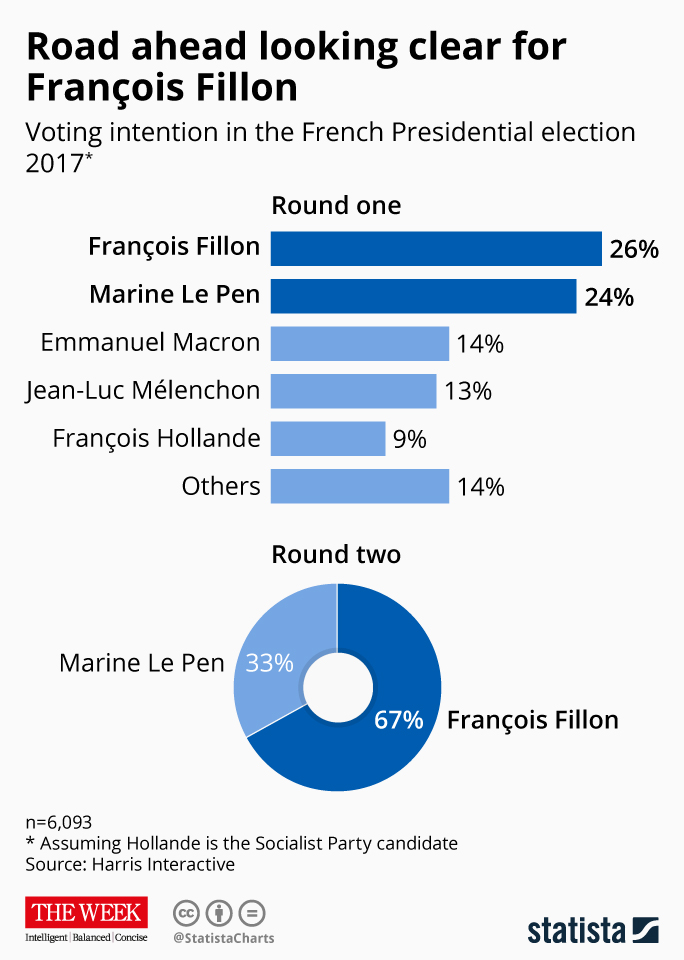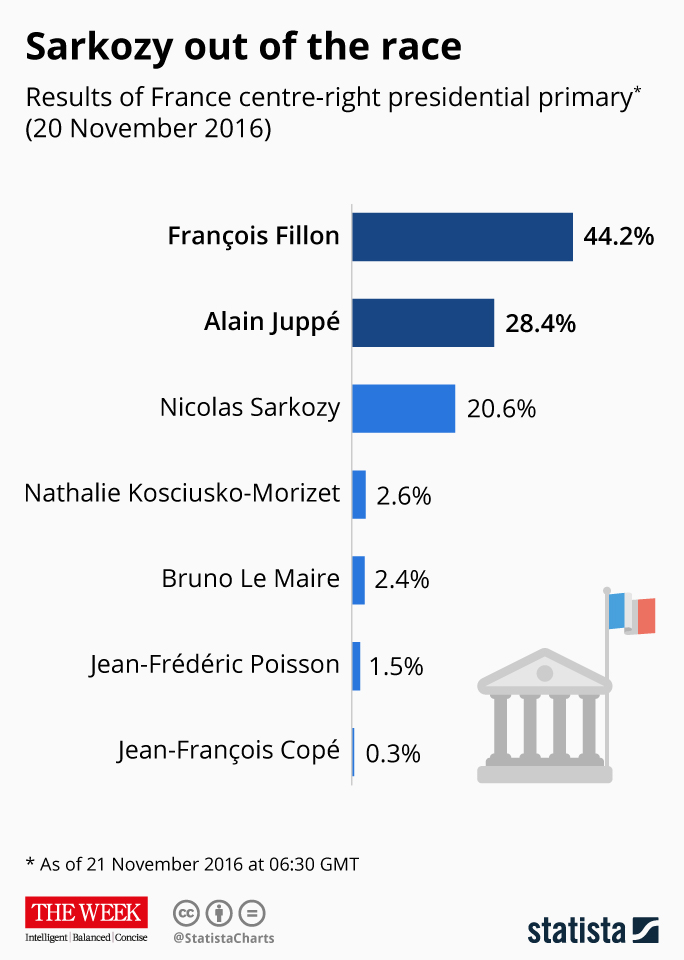French elections: Francois Fillon wins conservative primary
Centre-right candidate expected to face National Front leader Marine Le Pen in next year's presidential campaign

A free daily email with the biggest news stories of the day – and the best features from TheWeek.com
You are now subscribed
Your newsletter sign-up was successful
France's former prime minister Francois Fillon is to be the conservative candidate in next year's presidential election after winning his party's primary race.
Fillon, running as a centre-right candidate, defeated Alain Juppe, another ex-prime minister, who conceded within hours of the polls closing, having secured only 33 per cent of the vote.
"Victory is mine. It is a substantive victory built on belief," said Fillon.
The Week
Escape your echo chamber. Get the facts behind the news, plus analysis from multiple perspectives.

Sign up for The Week's Free Newsletters
From our morning news briefing to a weekly Good News Newsletter, get the best of The Week delivered directly to your inbox.
From our morning news briefing to a weekly Good News Newsletter, get the best of The Week delivered directly to your inbox.
The win is a "stunning victory for the candidate once seen as the 'third man' in the contest", says the BBC.
The Guardian reports Fillon's campaign gathered momentum in the days leading up to the vote, after he wrote a book on the "dangers of 'Islamic totalitarianism' in the wake of recent terrorist attacks in France".
Fillon, who was prime minister from 2007 to 2012 under Nicolas Sarkozy, is expected to face far-right National Front leader Marine Le Pen in the presidential election next April.

Polls suggest Le Pen will make it through to the final round, but "it would be difficult for her to win", The Guardian says.
A free daily email with the biggest news stories of the day – and the best features from TheWeek.com
The prospect of a run-off between Le Pen and Fillon marks a major shift in French politics away from the left, says CNN.
It adds: "Voters are widely expected to boot out the Socialist Party that has ruled France since 2012 under the leadership of President Francois Hollande, whose popularity is waning."
Fillon said: "The left has failed and the far-right means bankruptcy", adding: "My job is to rise to the challenge of changing France and changing its software."
Infographic by www.statista.com for TheWeek.co.uk.
Nicolas Sarkozy out of France's presidential race
21 November
France's former president Nicolas Sarkozy has been knocked out of the Republican party primary after polling third behind ex-prime ministers Francois Fillon and Alain Juppe in the battle to be presidential candidate for the centre-right group.
More than 2.5 million people voted in the first round of the race and with most of the ballots counted, Fillon led with 44.1 per cent, followed by Juppe with 28.3 per cent and Sarkozy in third place with 20.9 per cent.
"I have no bitterness, I have no sadness and I wish the best for my country," said the politician.
Sarkozy failed to win the nomination because of his "enduringly unpopular personality after five years in power," The Guardian says.
It adds: "A very large majority of French voters on both the left and right clearly didn't want to see him in power again."
Fillon and Juppe will compete in a run-off election on Sunday.

Fillon is regarded as an Anglophile and the most pro-business of the candidates. "I'm tagged with a liberal label as one would once, in the Middle Ages, paint crosses on the doors of lepers," he has said.
The winner is expected to compete against National Front leader Marine Le Pen, who has enjoyed a surge in the polls, says The Independent, adding to "growing fears that the rise of global populism could see Ms Le Pen secure a surprise victory in the wake of the UK's Brexit vote and Donald Trump's US election win".
Infographic by www.statista.com for TheWeek.co.uk.
-
 The ‘ravenous’ demand for Cornish minerals
The ‘ravenous’ demand for Cornish mineralsUnder the Radar Growing need for critical minerals to power tech has intensified ‘appetite’ for lithium, which could be a ‘huge boon’ for local economy
-
 Why are election experts taking Trump’s midterm threats seriously?
Why are election experts taking Trump’s midterm threats seriously?IN THE SPOTLIGHT As the president muses about polling place deployments and a centralized electoral system aimed at one-party control, lawmakers are taking this administration at its word
-
 ‘Restaurateurs have become millionaires’
‘Restaurateurs have become millionaires’Instant Opinion Opinion, comment and editorials of the day
-
 Greenland’s capital becomes ground zero for the country’s diplomatic straits
Greenland’s capital becomes ground zero for the country’s diplomatic straitsIN THE SPOTLIGHT A flurry of new consular activity in Nuuk shows how important Greenland has become to Europeans’ anxiety about American imperialism
-
 Epstein files topple law CEO, roil UK government
Epstein files topple law CEO, roil UK governmentSpeed Read Peter Mandelson, Britain’s former ambassador to the US, is caught up in the scandal
-
 Iran and US prepare to meet after skirmishes
Iran and US prepare to meet after skirmishesSpeed Read The incident comes amid heightened tensions in the Middle East
-
 Israel retrieves final hostage’s body from Gaza
Israel retrieves final hostage’s body from GazaSpeed Read The 24-year-old police officer was killed during the initial Hamas attack
-
 China’s Xi targets top general in growing purge
China’s Xi targets top general in growing purgeSpeed Read Zhang Youxia is being investigated over ‘grave violations’ of the law
-
 Panama and Canada are negotiating over a crucial copper mine
Panama and Canada are negotiating over a crucial copper mineIn the Spotlight Panama is set to make a final decision on the mine this summer
-
 Why Greenland’s natural resources are nearly impossible to mine
Why Greenland’s natural resources are nearly impossible to mineThe Explainer The country’s natural landscape makes the task extremely difficult
-
 Iran cuts internet as protests escalate
Iran cuts internet as protests escalateSpeed Reada Government buildings across the country have been set on fire